Engaged Anthropology Grant: Karen Allen
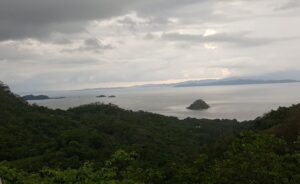
Back in 2014 when Karen Allen was a doctoral student at the University of Georgia, Athens, Georgia, she received a Dissertation Fieldwork Grant to aid research on “Sustainable Development in Costa Rica: Understanding Values, Land Use Decisions, and Market-based Mechanisms for Conservation,” supervised by Dr. Ted Gragson. Dr. Allen was then able to return to the field in 2018 after receiving an Engaged Anthropology Grant to carry out her project, “Fostering Conservation Ethic Through Dialogue in the Bellbird Biological Corridor, Costa Rica”.
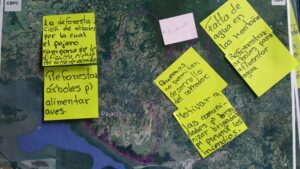
This project entailed coordinating and carrying out two workshops in the Bellbird Biological Corridor, Costa Rica. This is a mixed-use area and is part of Costa Rica’s relatively new biological corridor network (www.cbpc.org). The national network system as a whole aims to foster ecological connectivity and sustainable development across the country (www.sinac.go.cr/EN-US/correbiolo). The purpose of these workshops was to strengthen the connections between the conservation organizations that oversee the Bellbird Biological Corridor, and the people who live within the corridor. This project grew directly out of Wenner-Gren funded dissertation research, where I investigated the ways in which conservation policy influences land-use decisions within the corridor. It became clear early on in my research that very few people had actually heard of the Bellbird Biological Corridor, and the boundaries and objectives of the corridor where not clear. I devised these workshops with a dual purpose: to provide information about corridor objectives and the conservation imperatives, and to foster dialogue about the broader sustainable development objectives. Further, this process built the foundation, and the social capital needed to continue similar efforts into the near future.
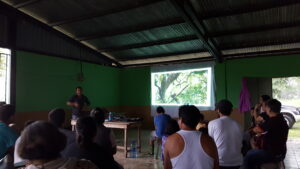
The workshops took place in two different towns within the corridor. I chose the towns in collaboration with corridor organizations based on the strength of their past interactions with these towns, as well as my experiences and connections in each place. Because the towns were quite dissimilar (one was a coastal fishing village, and another a mountain agrarian village), the workshops were a bit different in each locale. In the fishing village, Costa de Pájaros, I organized and hosted a three-hour workshop in conjunction with the Asociación de Mujeres Mariposas del Golfo. We publicized this workshop through the community organizations, as the Asociación de Mujeres (women’s association) decided that it would be best to focus on integrating the various organizations in the region. There were approximately thirty to thirty-five people in attendance. This workshop began with an introduction to the Bellbird Biological Corridor, given by the current corridor director. We then split into groups, where they used maps of the corridor, and maps of the region, to identify social-ecological challenges and potential solutions. Each group presented a summary of their discussion. We then talked about particular initiatives that already exist in the corridor, and forged connections between the people who wanted to pursue those initiatives further and those coordinating the initiatives. We also made a “wish-list” of ideas that might be possible to undertake in the future.
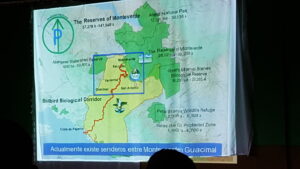
In the second workshop, in Santa Rosa, we followed a similar format, but included a few more presentations. We publicized this workshop by visiting all houses in the town of Santa Rosa (approximately fifty) and explaining the purpose of the workshop. The local Asociación de Desarrollo (community development organization) decided that it would be good to make the workshop longer (about four hours) and include a few more presentations on different initiatives in the region. In total, we had approximately thirty-five people from Santa Rosa attending the workshop. In addition, three corridor representatives came to speak about the corridor initiative, and four representatives came from the neighboring community of San Luis to share their experiences with the Sendero Pacífico, a trail network (senderopacifico.net). There is a possibility of extending this trail network to Santa Rosa, and several people spoke to that effect. We also examined the social-ecological challenges in the region with this group, and established several follow-up initiatives for future collaboration. As in the first workshop, we spent time reviewing the initiatives that already exist in the region, and brainstorming future possibilities and collaborations. And of course, both workshops concluded with a shared meal – arroz con pollo!
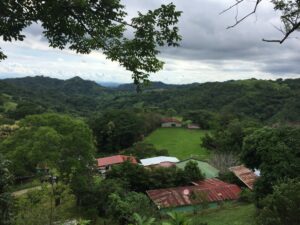
Some of the more exciting things to come out of these workshops were the new ideas and connections that emerged. The organization leaders that I worked with have since commented to me that they have continued to contact people they met at the meetings. Further, we have begun to brainstorm future engaged projects that came out of these experiences. People seemed excited and motivated by the workshops and it is inspiring for me to see these events as the direct output of many years of more theoretical dissertation research. I see many possibilities for future engagement, and I plan to continue this work in the future.